Year Of Progress To Decommission Dounreay
25th July 2006
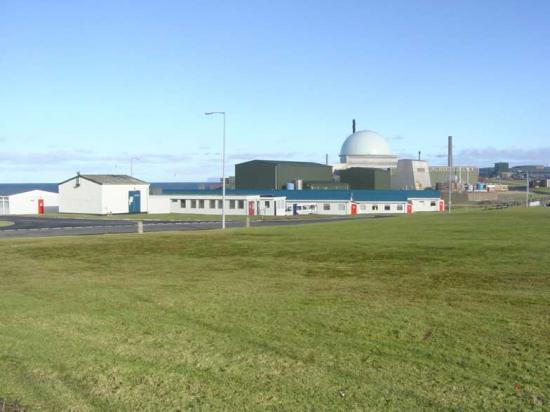
The first annual report on progress to decommission the former experimental reactor site at Dounreay is published today.
Dounreay Review 2005/06 has been produced by UKAEA, the body carrying out the safe clean-up and dismantling of the 140-hectare site.
Its publication covers the 12-month period since April 1, 2005, when UKAEA's clean-up role changed to that of a contractor to the new Nuclear Decommissioning Authority.
The report outlines the key decommissioning achievements during the year as well as safety, environmental and financial indicators, and summarises the performance-based incentives that are used by the NDA to measure delivery and award fee.
Fourteen buildings were demolished, 18 laboratories cleaned out, 20 glove-boxes and 25 fume-cupboards removed, a shielded cell was decommissioned and 150 tonnes of sodium was destroyed.
Clean-up and dismantling work generated almost 250 drums of solid intermediate-level radioactive waste that were checked and consigned for storage, and over 5000 drums of solid low-level radioactive waste that were processed for disposal. In addition, 105m3 of liquid waste was successfully conditioned as solid intermediate-level waste before this work was interrupted by a spillage. A further 403 m3 of waste exempt from the
Radioactive Substances Act was generated and disposed of.
There were 10 Lost Time Accidents among the 2000 or so workers, with a maximum continuous period of almost two million man-hours without a LTA. There were 20 safety events, only one of which - the spillage in the waste treatment plant - was serious enough to be registered on the International Nuclear Event Scale. The highest radiation dose received by a member of staff was 3.26 mSv, which is 16 per cent of the annual legal limit, and the average radiation dose was 0.06 mSv.
Discharges of radioactivity to the environment were 13.25 per cent or less of the authorised limits for different radionuclides. Four radioactive particles were detected during monitoring of almost five million square metres of local beaches, and a further 41 were retrieved from the seabed.
UKAEA delivered the programme at seven per cent below budget and brought forward an additional �12 million of work from future years. Expenditure during the year was �145 million.
Dounreay Review 2005/06 can be downloaded
See Here
Hard copies can be obtained from the Communications Department, Dounreay
(tel: 01847 806080).
Related Businesses
Related Articles
UKAEA develops 3D printing for fusion components
At its recently opened Central Support Facility (CSF), UKAEA has commissioned an electron beam additive manufacturing machine that can be used to incorporate tungsten into components, alongside a selective laser manufacturing machine. Fusion can play a key role in a global low carbon energy future.Advancing Fusion Remote Maintenance: Industry Collaboration Driving Innovation
As part of the Fusion Futures (FF) programme, UKAEA's Remote Applications in Challenging Environments (RACE) has partnered with industry leaders to develop two groundbreaking technologies for remote maintenance in fusion energy engineering. Thanks to FF funding, industry has taken the lead in maturing UKAEA technology concepts—delivering real-world solutions that enhance operational autonomy and reduce maintenance burdens in extreme environments.UKAEA launches International Fellowships Scheme for fusion
UKAEA has launched the International Fellowships Scheme, an initiative to help expand the global talent pool supporting the fusion industry. The scheme is part of the UKAEA's Fusion Opportunities in Skills, Training, Education and Research (FOSTER) Programme, which aims to train, support, and empower the next generation of professionals, who will help deliver fusion power to the grid.Kyoto Fusioneering and Astral Systems join Culham fusion hub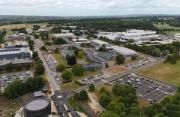
UKAEA's Culham Campus welcomes Kyoto Fusioneering and Astral Systems as its latest tenants. Two pioneering companies, Kyoto Fusioneering and Astral Systems, have joined the growing cluster of fusion technology and AI organisations at United Kingdom Atomic Energy Authority's (UKAEA) Culham Campus.
Fusion-grade Steel Produced At Scale In UK-first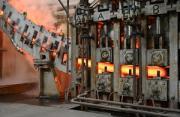
Researchers achieve 10x production cost savings for reduced activation steel. A United Kingdom Atomic Energy Authority (UKAEA) working group has successfully demonstrated the industrial scale production of fusion-grade steel.
UKAEA To Lead The Creation Of A Robotics And AI Cluster
UKAEA will lead the creation of a new £4.9m nuclear robotics and artificial intelligence cluster across Cumbria and Oxfordshire. The robotics and AI cluster was announced by UK Research and Innovation (UKRI) as one of seven new projects to kickstart economic growth and address regional needs: www.ukri.org The robotics and AI cluster will link Cumbria and Oxfordshire to accelerate the decommissioning of the UK's legacy nuclear fission facilities and keep people out of hazardous environments.
Diamonds Are Forever? World-first Carbon-14 Diamond Battery Made In Uk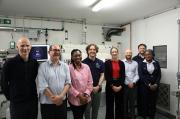
The world's first carbon-14 diamond has been produced with the potential to provide power for thousands of years. Scientists and engineers from the UK Atomic Energy Authority (UKAEA) and the University of Bristol have successfully created the world's first carbon-14 diamond battery.
UKAEA Monthly Newsletter Latest Edition
Find out what has been happening at UKAEA in our monthly newsletter. Read about our recent activities and upcoming events.
UKAEA Newsletter - Edition 11 Published Today
Find out what has been happening at UKAEA in our monthly newsletter. Read about our recent activities and upcoming events.
Corwm Visits Dounreay Nuclear Site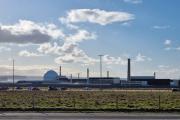
Members were given an overview of the scale of the problem and challenges faced in the decommissioning of the site. In the last week of March 2024, several members of CoRWM led by the Chair, Sir Nigel Thrift, made the long journey up to the North of Scotland to visit the Dounreay nuclear site, now managed by Nuclear Restoration Services.
